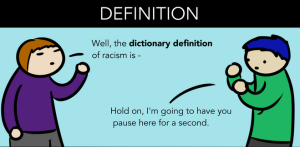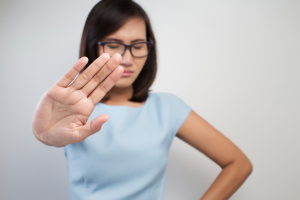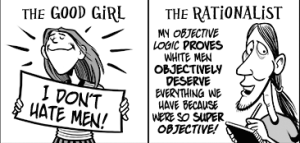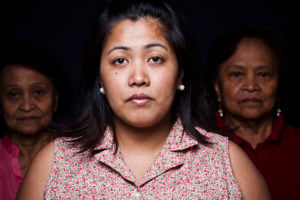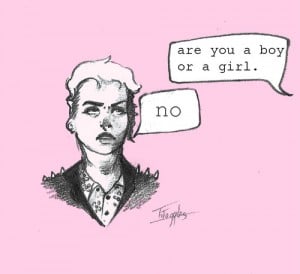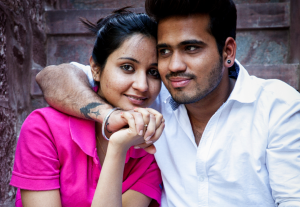Author’s Note: In this article, I’m focusing on how sexist ideas inform our perception of heterosexual relationships. I want to be clear that this is a deliberate choice, to dive deep into the particular ways these issues affect heterosexual relationships, and not a presumption that intimate partner violence doesn’t show up in LGBTQIA+ communities. I’ll focus on the impact of other forms of oppression, including heterosexism and racism, in articles dedicated to those topics.
Going through intimate partner violence (IPV) is a lonely experience.
You may think that’s because survivors keep the abuse to themselves, but actually, the majority tell at least one person, and often multiple people and agencies. The struggle is in finding helpful support that won’t leave them feeling judged, misunderstood, or ignored.
Of course, most of us would never want a survivor to feel this way, and we sure wouldn’t want to contribute to marginalizing a survivor.
But a lot of the mistreatment of survivors is unintentional – a consequence of harmful societal norms and myths about relationships and gender roles. The sexism in these norms and myths leads us to misunderstand the nature and impact of intimate partner violence. And as a result, many survivors have the experience of feeling like they have nobody to turn to.
Understanding how sexism warps our perception of intimate partner violence can help us cultivate new cultural norms of supporting survivors, rather than routinely letting them down and allowing cycles of violence to continue without healing.
Let’s examine some common tropes about gender and relationships, and unpack how they show up when we respond to IPV.
1. The Hysterical, Overemotional Woman
This may sound to you like an outdated stereotype: the oversensitive, melodramatic woman as depicted in old timey movies full of blatant misogyny. And it wasn’t just a trope for the movies – “hysteria” was once an actual diagnosis attributed to women.
We don’t actually still buy into that – do we?
Maybe not in such blatant ways, but dismissive attitudes toward women’s emotions show up in everything from relationship advice to work culture.
Ever heard or said that a woman in a tumultuous relationship is “blinded by love,” “crazy,” or “attracted to assholes?”
These same attitudes blaming women’s “misguided” emotions for what we judge as “bad” choices come up when we doubt survivors’ capacity to make smart decisions. And by that reasoning, when we blame them for bringing about their own troubles because they don’t follow what we see as the only rational path.
Survivors often face an uphill battle on one of the very first steps in the process of getting help: getting someone to believe that what they say about the abuse is true.
Some of the common phrases survivors hear show that many people still see women as prone to overreacting. For example:
“He’s not hitting you? Then what’s the big deal?”
“Are you sure? He’s such a good person…”
These may sound harsh, but well-meaning people can disregard survivors’ feelings, too – even when they’re trying to help.
Loved ones commonly urge survivors to do what they think is best – since the understanding is that they’re in too much of an “overly emotional” state to make wise decisions – and this often translates to suggesting leaving their partner immediately and/or calling the police.
But it’s not up to anyone but the survivor decide what to do, and if you’re making decisions for your loved one, then you’re not supporting their power to regain control over their own life and choices. You’re also taking away from their ability to trust their own feelings – and it’s crucial for all of us to be able to listen to our emotions, the intuitive wisdom that takes care of us.
2. The Submissive Woman Who’s Responsible for the Stability of the Relationship
This is another trope we may think of as antiquated. Our society has progressed well enough that nobody actually treats women as submissive or inferior to their male partners, right?
While you may not consciously believe that women should be submissive to men in relationships, the idea that they should be comes through in both subtle and obvious ways.
One way is in the perception of women as caretakers. Many relationships with abusive partners have a woman putting her partner before herself.
We recognize this dynamic as unhealthy when abuse is present, but the thing is, we encourage this in women all the time.
So victim-blaming happens again with responses that overtly accuse or subtly imply that survivors have done something wrong to provoke the abuse. Any time we reinforce gender roles in relationships, we also reinforce the idea that women who don’t fit those rigid roles are responsible for what goes wrong in a relationship.
For instance, when sex tips are consistently designed for a woman to give pleasure to a man, rather than thinking of her own pleasure, we emphasize the idea that a woman’s role is merely to please and serve a man (an attitude that can remain even when force or coercion is involved).
When we minimize men’s controlling behavior, even calling it sweet, the sense of their ownership of women condones abusers’ control over their partners’ lives.
And since the societal ideal of a woman’s role is impossible for anyone to fit – and particularly women from marginalized communities – this message is bound to have a damaging impact on survivors.
3. The Woman Who’s Weak and Helpless
Here’s one more supposedly outdated image: the damsel in distress. Maybe we don’t see her tied to railroad tracks in the movies anymore, but unfortunately, the damsel in distress trope is still a thing.
It’s just one part of the way society conflates feminine characteristics with weakness and victimhood.
This is dangerous for survivors for so many reasons.
For one thing, even casual sexism perpetuating ideas about feminine weakness can shape ideas about female inferiority and bolster tolerance for violence against women.
And continuously seeing women as victims has a flip side: profiling men as aggressors – and accepting their violent role as the “norm” for their gender.
If we’re taught to view femininity as weakness, what does that mean about how we see survivors who are women? Frail, fragile, and in need of protection, maybe?
That image is way off, and it only leads us to more judgment against survivors who don’t fit the mold of the “perfect victim.”
For instance, those who fight back to defend themselves, whose trauma leaves them with fuzzy memories of what happened, or who don’t display the emotional response we expect don’t get the benefit of the doubt when it comes to believing what they say.
And seeing survivors as helpless once again puts loved ones in the position of thinking they have to rescue a survivor who’s incapable of taking care of herself. That’s a very insensitive way of treating someone whose own strength and resilience helped her survive before you even knew about the violence in her relationship.
A More Empowering Approach
Now that you’re aware of how sexist norms can lead you to mistreat survivors, you can reconsider the common approaches to intimate partner violence and choose another way instead.
Here’s the wonderful support you can offer when you leave the sexist ideas about survivors behind:
1. Believe Survivors
And not just those who fit neatly the “perfect victim” image.
Believe survivors who are emotional, who don’t quite remember every detail of the abuse, who don’t leave their partners as soon as they recognize abuse – these are also survivors who deserve support.
2. Encourage and Support Survivors to Trust Their Feelings
Give space for them to be present with their emotions, including emotions that may be uncomfortable, like fear and sadness.
Resist the urge to “fix” the situation in an effort to make the feelings go away.
By helping a survivor be present with the way the abuse impacts them, you’re already providing major support to help them stop minimizing what’s going on and make healthy choices.
3. Respect Their Self-Determination
It’s extremely important that you allow survivors to make their own choices, even if those choices don’t agree with what you want them to do.
Every survivor knows what’s best for themselves, and though it may be hard to sit with some of their decisions, remember that each choice they make all on their own is a victory in breaking free from the power and control of their partner.
4. Challenge Gender Norms
Rigid society norms of how we’re “supposed” to behave disregard our individuality and harm all of us.
So this is all the more reason to dismantle them: Getting rid of gender norms can shift the attitudes that lead to victim-blaming and tolerance for abuse, creating new norms that can end cycles of violence.
***
The fight for gender justice and the effort to end violence against women go hand-in-hand. You have the power to make a difference in both endeavors by offering empowering support to survivors.
[do_widget id=”text-101″]
Maisha Z. Johnson is the Digital Content Associate and Staff Writer of Everyday Feminism. You can find her writing at the intersections and shamelessly indulging in her obsession with pop culture around the web. Maisha’s past work includes Community United Against Violence (CUAV), the nation’s oldest LGBTQ anti-violence organization, and Fired Up!, a program of California Coalition for Women Prisoners. Through her own project, Inkblot Arts, Maisha taps into the creative arts and digital media to amplify the voices of those often silenced. Like her on Facebook or follow her on Twitter @mzjwords.
Search our 3000+ articles!
Read our articles about:
Our online racial justice training
Used by hundreds of universities, non-profits, and businesses.
Click to learn more






